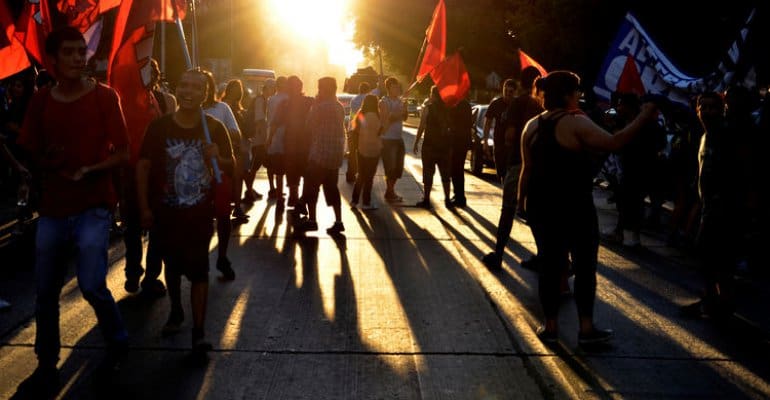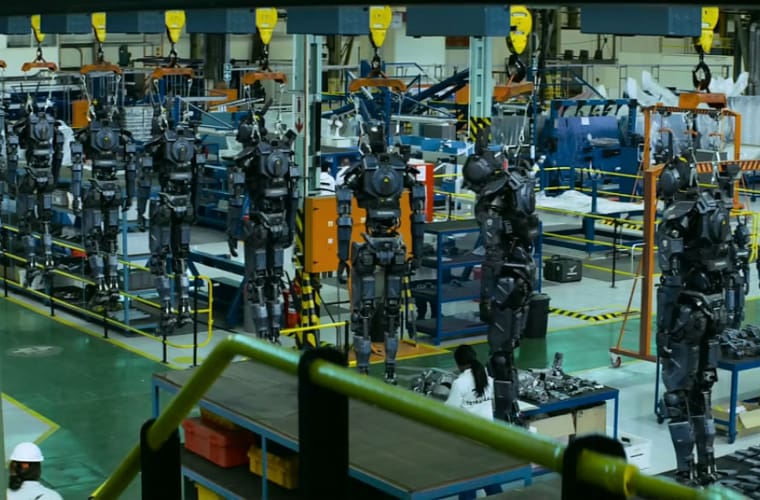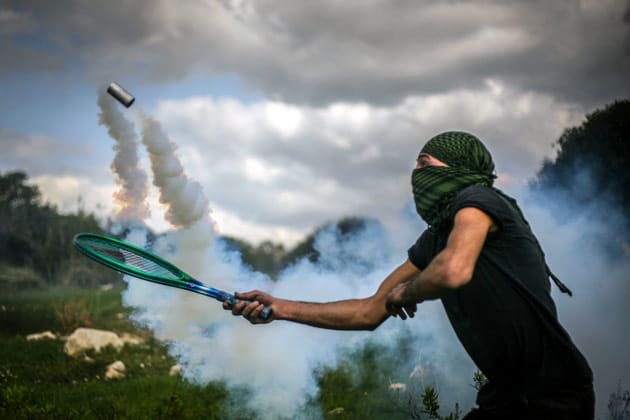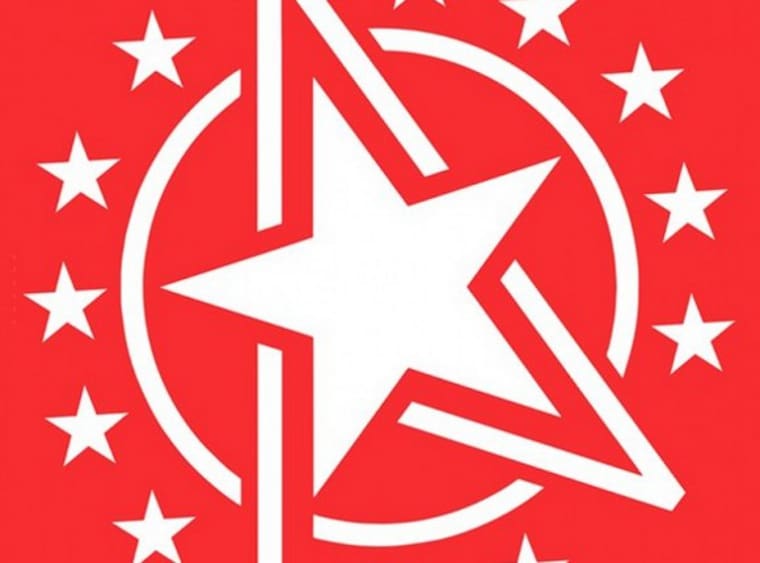Who are the Communists Really?
by Carlos Pérez Soto for Sicario Infernal (original post in Spanish)
translated by Una Gatito for Antidote; deutsche Übersetzung hier einzusehen
1. In 1848, the communists were those who saw the private property of the means of production as the origin of capitalism’s evils. Karl Marx proposed to call “League of the Communists” to what until then was known as the “League of the Just”, because he understood that it wasn’t only about justice in general, in the manner of a moral demand, but that the issue was organizing a direct political opposition to de ruling system as a whole.
Marx called communists those who recognized the profound movement of reality, the material liberating possibilities obstructed by the capitalist interests, the political possibilities that opened up the organized consciousness of the workers.
He argued that the power also noticed that great historical change in the present, he wrote that the ruling powers had already started to fear their revolutionary potential, he wrote that communism had begun to swept across Europe like a menacing ghost:
“For a holy war against this ghost, all the forces of old Europe joined hands – the Pope and the Czar, Metternich and Guizot, the French radicals and the German policemen. Where is the party in opposition that has not been decried as communistic by its opponents in power? Where is the opposition that has not hurled back the branding reproach of communism?”
Marx called communists a kind of revolutionaries who, in spite of how precarious and incipient their organizations and specific political initiatives may have seem, were feared by the ruling power. They were frightening because of their radical program; frightening because of their willingness to radical political action.

2. In March of 1918, Lenin proposed to call the Bolshevik Party the “Communist Party” to emphasize the differences with those who did not believe that the October Revolution could become a huge step forward in the struggles of the proletariat. In December 1918, the “Spartacist League”, led by Rosa Luxemburg and Karl Liebknecht, became the German Communist Party, declaring their support to the October Revolution, to its democratic potential and its opposition to the reformist Marxism of Karl Kautsky.
Through 1918 and 1919, several communist parties were formed in the same spirit of the German Party. In March 1919, the first Third International Congress was held, which called itself Communist International. At this moment, communists where called those who recognized the necessity of radical action to overthrow the ruling system, those who acknowledged the need of a revolutionary dictatorship of the proletariat against the dictatorship – whether it was democratic or not – of the capital, expressed in a State of Law, which systematically favored the bourgeoisie against the interests of the people as a whole.
Between 1918 and 1929, in spite of the revolutionary war, in spite of the capitalist siege, in spite of the economic difficulties, the soviet communists built for the first time in history, a national, secular and free education system and a free general health system, designed for the needs of every and each citizen. They established, for the first time in human history, the full juridical and political rights of women, they established the foundations of a legal system which systematically favored the interests of the proletariat, that is, a dictatorship of the proletariat. They wanted to take bigger steps, the most radical, to pursue precisely what its name stated: a communist society, a world without class struggle.
3. The self-destructive obsession that got us used to think from the logic of defeat has led us to endlessly highlight the multiple reasons why this great initiative of the proletariat resulted in a bureaucratic dictatorship and in totalitarianism.
The reasons are many, severe, and the drift of communism turned out to be tragic and destructive. This is something we know and that our enemies enjoy to point out, omitting the devastating consequences for all mankind of what they advocate themselves. And this is something that we ourselves, when it comes to justifying our policies of compromise, got used to point out, as if we were condemned to be defeated over and over again.
But the merely punctual only initial aspect that interests me here, in this resort to history – from which I’m not very convinced – is what the long shadow of the bureaucratic socialism has meant for this original and founding name. Its significance for the idea of what it means to be a communist.
4. The bureaucratic socialism profoundly distorted the logic of the communist call of the Third International. It turned into communists two types of apparently opposing militants. On the one hand, those who, under the prime imperative to defend the reality and example of the Soviet Union, tried to reproduce over and over the paths and the political concrete actions that led to the October Revolution, and on the other hand those who, under the same logic, sought to reach socialism through the intricacies and springs of the parliamentary democracies which were developing through the 20th century. Mao Zedong and Palmiro Togliatti are the best and perfectly symmetric examples of this policies. The keynesian reformism of the Italian communism and the massive conversion to capitalism of the Chinese communism, are now the testimony of what the bureaucratic communists historically meant.
With them, a communist policy was carried out in which, curiously, the first thing to disappear from the discourse and from the action was precisely the communist goal. Everything became transition. And the transitions were never discussed according to their goals, but simply depending on the relative, more or less formal proximity or distance to the soviet model.
Communist became synonym of statism, of industrialization, of organizational verticalism, of critical convictions in which the necessity for unity of action always outweighed the critical vocation itself.
The communist policies maintained an ambiguous position regarding revolutionary violence, accepting it for the periphery, denying it for the developed countries. An ambiguous position regarding the bourgeois rule of law, attacking it directly when there were favorable correlation of forces, accepting it as an iron framework when considered that there were no chances of effective seizure of power.
As noted so many times before, the communist politics turned into vindictive, particularly economistic ones. And the communist militants, who wereraised in an homogenizing culture, had systematic difficulties appropriating, in a comprehensive manner, any field which was not that of the socio-economic vindication.
In this way, environmental problems, those of ethnic and gender differences, the problems arising from the use of communication technologies were difficult for them, remaining fortunately in the hands of other non-marxist radicals, who were able to see the sources of criticism and political action that this issues contained, opening up the opposition to the system to a wide spectrum of struggles, to which the militants called communists always arrived late, badly, and with an always present stalinoid vocation to make them serve their own policies.
Far from wishing to continue with this whining and masochistic policy, which is pretentiously called “self-criticism”, and which barely covers an opportunistic vocation, what interests me here is not listing once again the reasons and non-reasons of what was lost, but to elaborate directly about the future. To elaborate directly upon the great task that lies ahead of humanity, the material premises of which we notice everyday, without being at the level of needing a policy to make it plausible and viable.

5. How much of this should be still called “communist”? In the sense of Marx, in the sense of the Bolshevists, beyond the stamps and the registered trademarks, who should be called actually communists?
First of all, communists are those who believe that communism is possible. That a society without social classes is neither a dream, nor a utopia, nor the inertial result of an indefinite economic an technical progress. Those who put this perspective at the center of their policies and are able to explain and promote it in an effective, explicit way, without telling the story that this was about a limit, that this was an extremely distant goal.
Without the story of a transition, first to an advanced democracy, then to socialism, then to the foundations of something, and there, far beyond of what is conceivable, to a society which cannot be imagined today. Without the story of a transition that never ends, during which, to be merely pursuing this limit becomes a political profession, an eternal job, not naive at all, which is rather a form of livelihood than a struggle for the future.
Communists are those who can explain to ordinary people in a simple and direct manner that the abundance of material goods is already a reality and that humanity already reached the condition in which it could share it fairly and in an equitable way. They are the ones who are able to explain that there is no fundamental impediment, neither in nature nor in human condition which restricts us forever, which compels us to accept manifest injustice or the simple mediocrity of the middle class’s lives as the only possible horizon.
Communists are the ones who declare and constitute their policy at every turn thinking of a society where you have exchange, but no market, where you have families, but no marriage, where you have government, but no state, where social norms don’t need to be reified in the shape of a rule of law.

6. But none of this is possible without a program. Communists should be called those who have a communist program. Those who can express in a concrete, actual and real manner, policies which effectively lead to its historical goals.
I’m not holding this lecture here today to highlight historical grievances or moral challenges. What I substantially want to claim is what should be the real and concrete policies. Around what kind of politics can we really call ourselves communists. What matters to me is not who has the right to show off that name or to shelter that trademark but the substantial problem of what are the contents which its concept requires and demands.
This is only possible through the deservitization of the economy [servitization: service-oriented economy], which moves us away from the stupefying work, with which we become all producers of material goods, and which completely liberates the services from the logic of the labor market.
Nobody should get a salary for educating, for developing knowledge, for doing art or for providing health services. The only principle for the salary should be the production of physical goods, and that the services finally become basic rights to be freely practiced beyond every market logic.
The immediate consequence of this, and at the same time a parallel principle, is to radically lower the working hours, to generally distribute the necessary physical labor among all members of the labor force. For this, during a long epoch of transition, will be necessary to maintain or even improve the salaries. The only way to do this is that the cost of the operation is taken from the surplus value, that is to say, that the enormous productivity increases are appropriated by the actual producers, in a directly opposed way to its capitalist appropriation.
Every decrease of the workday to be obtained maintaining the salaries is nothing but a reappropriation of the surplus value, a social appropriation of the effects of technological development we have created among all of us. The decrease of the workday is, directly and effectively, the beginning of the long march towards communism.
8. The communist policies must draw an horizon of concrete, viable and real measures which address the most immediate needs and allow the progressive construction of hegemony, material and political autonomy of the people as a whole.
Firstly, in the material sphere, a policy of radical decentralization of food production. At the same time, a policy of radical decentralization of energy production. And also, a policy of radical decentralization of the cities.
All policies that point to the autonomy, alimentary and energetic self-sufficiency of the base communities; every policy pointing to decreasing the scope and increasing the effective power of the towns; every policy pointing to the citizen control over education, health, housing and cultural management, is directly in the road of the long march towards communism.

9. The logic of defeat and the bureaucratic opportunism got us used to see policies like this with a well intended, patronizing and ironic distance. They got us used to think that nothing really important can start to happen now. They got us used to think tiny, in a short-sighted way, in a poor short-term, in the small political circuit in which the bureaucratized politics of the ruling powers move.
We ourselves have become accustomed to the petty-bourgeois story of the “utopian”, we have resigned to the sentimental and a bit hypocritical logic of being “dreamers”, and we often get used to not even dream, to simply devote ourselves to every-day life as if all important things were in an indefinite future, or worse, as if the important things were the mediocrities imposed by the present and by the power.
That’s why the formulations, the policies that I mentioned, are not enough, although they are the essential to get the communist spirit out of its marasmus. It is also necessary to formulate another sphere of immediate policies which have the unimaginative concreteness to which the communist spirit has been reduced, but which also have the radical nature needed to make them worthy of being called communist. A program which effectively creates fear among the ruling powers, which reminds them that the old mole doesn’t rest and that it’s willing to emerge over and over again with its challenge.
10. For this reason, and because it is necessary to do it for oneself, communists should formulate a strategic plan which passes through the immediate, which defines that great horizon of progressive construction of popular hegemony, with the tasks and difficulties of the present.
In this sequence, the first enemy to be faced is the financial power. To radically lower the banking and commercial interest rates, to radically rise the banking taxes, to conclusively prohibit the ways of capital’s reproduction that are openly unproductive and speculative, to remove all state guarantee to private debts, to prevent henceforth the “bailout” of the banks at the expense of the worker’s life standards. This is today a worldwide crusade. The most extensive political sectors, of almost every hue, are for carrying out this reforms, even in a radical manner. The communists should be the first and the most persistent ones in this struggle which belongs to all.
The second major enemy that needs to be faced is the rentierist transnational capital, that one who usufructs on a private basis of the resources which nature had made available to all. To repeal the regime of full concessions, to immediately invalidate the concessions of natural resources made behind the back of the people in the mining, the fishing, the forests, in the water resources. Communists should be the first ones in this, and not only formally through non-viable projects within the established institutional system.
That’s why the third major enemy that must be faced is the political system itself. The machinery of state institutions organized so that their only real function is their own reproduction, as well as to operate at the service of private interest. There is no possible political future without a new constitution which is built by the Chileans in a democratic way. And we will not move towards that goal under the laws of a qualified quorum, nor in the context of binominal participation. Being outside a tainted and antidemocratic system legitimizes us, to pretend to be inside only leads to legitimate them.

11. Deservitization of the economy, reduction of the workday while maintaining the salaries and an end of the regime of full concessions, radical restriction of the operations and usurious profit of the banks. These are therefore radical measures. A fearless policy. The issue is to effectively represent, today without much justification, what they fear about us. The issue is to be communists because we seek an end to the class society.
I don’t need to make clear that it’s quite probable that the ruling powers don’t like such a policy very much, not even at the merely rhetorical level. The enemies of democracy will call us “enemies of democracy”, those who have deprived the majority of human beings of property will call us “enemies of the property”, those who have created a deeply violent system will call us “violent”. And, of course, they will be not satisfied with only declaring it. They will proceed, like they always did, with direct violence against those who rise up against their violence. There is and will be no novelty in that.
But then, facing the violence of the ruling classes, communists should be called those who acknowledge our right to revolutionary violence against the institutionalized one.
The misery in the public hospitals is the violence, the destruction of the educational system is the violence. The precarious wages, the usurious debt, to give away to the foreign capital the natural wealth which belongs to all of us, to put the state completely to the service of capital, when state officials put their own interests before the interests of those they claim to be representing: that’s violence.
We will criticize the vanguardist violence, we will legitimize our violence turning it into the violence of the masses. We will seek ways to struggle which don’t lead to crime and sacrifice, we will concede to our enemies each and every human right they themselves deny to us. But the issue is fighting this struggle with everything we have at hand.
Santiago de Chile, 23rd November 2012

Carlos Pérez Soto is a teacher of Physics, an academic at several universities and professor of Philosophy of Science at the University of Chile. An autodidact who has written and published about science, Hegel, history of dance and marxism. Proud owner of all the literature of Pablo Neruda in his first editions and a marxist, especially a marxist. However: A marxist without the marxologists. A marxist thinking of Marx, but looking toward the future. Staunch critic of postmodern academic fashions,of the resignation disguised in the theory, of the culture of defeat that characterizes the left of the new century. This is the field from which Carlos Perez Soto speaks.





